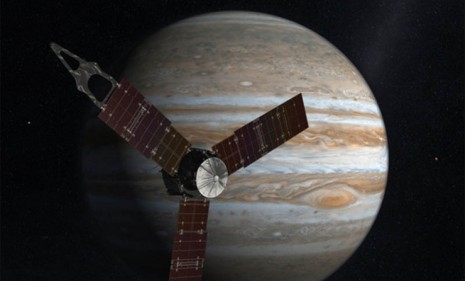NASA's solar-powered Jupiter probe
The unmanned spacecraft Juno will orbit our solar system's gaseous giant 34 times, in a quest to unlock Jupiter's many mysteries

A free daily email with the biggest news stories of the day – and the best features from TheWeek.com
You are now subscribed
Your newsletter sign-up was successful
Even though it's the largest planet in our solar system, Jupiter is also one of the least understood. In the coming years, however, it might be forced to give up some of its secrets — NASA is planning to launch an unmanned spacecraft on Aug. 5 that will orbit Jupiter 34 times. The craft, Juno, heralds a new era for the space agency following the end of its shuttle program. The Juno mission is the second of NASA's New Frontiers planetary explorations (the first is a spacecraft that will fly by the Pluto-Charon system in 2015), and will cost about $1 billion. Here, three key questions about the Juno program:
Why Jupiter?
Besides the immensity of the planet — it could fit everything in the solar system except the sun inside of it, and still have room leftover — Jupiter is considered unique among our celestial neighbors. Due to its powerful gravitational pull, Jupiter has cannibalized at least 20 of its moons, though it still has more than 60 remaining. The planet's famous Red Spot, which puzzled astronomers for centuries, is actually a massive hurricane larger than Earth. Jupiter's powerful electromagnetic fields create a "magnetosphere" that extends far beyond the planet. What we know about these Jovian features, however, pales in comparison to what we don't know — which is why Jupiter is ripe for exploration.
The Week
Escape your echo chamber. Get the facts behind the news, plus analysis from multiple perspectives.

Sign up for The Week's Free Newsletters
From our morning news briefing to a weekly Good News Newsletter, get the best of The Week delivered directly to your inbox.
From our morning news briefing to a weekly Good News Newsletter, get the best of The Week delivered directly to your inbox.
What mysteries does Jupiter hold?
No one is certain, for example, if Jupiter has a solid core beneath its swirling gases. Scientists are still trying to ascertain how Jupiter's hydrogen and other gases move and change over time. And since it was the first planet to form after the sun, Jupiter is made up of the gases that were present at the creation of the solar system, so it may hold the key to how planets formed. "We are after the recipe for planet-making. To get the list of ingredients — this is the place," says astronomer Scott Bolton, as quoted in the Los Angeles Times.
What's unique about the spacecraft Juno?
First, the craft will be launched by the most powerful Atlas rocket ever built, sending Juno on its five-year journey to Jupiter. Three windmill-like solar panels will power Juno's electronics, making it the most distant probe ever to use the sun as an energy source. And once Juno has completed its mission, it will be destroyed by plunging directly into Jupiter, to avoid the chance of contaminating a potentially life-bearing Jovian moon with earthly microbes.
A free daily email with the biggest news stories of the day – and the best features from TheWeek.com
Sources: Associated Press, International Business Times, LA Times, Nature
-
 Antonia Romeo and Whitehall’s women problem
Antonia Romeo and Whitehall’s women problemThe Explainer Before her appointment as cabinet secretary, commentators said hostile briefings and vetting concerns were evidence of ‘sexist, misogynistic culture’ in No. 10
-
 Local elections 2026: where are they and who is expected to win?
Local elections 2026: where are they and who is expected to win?The Explainer Labour is braced for heavy losses and U-turn on postponing some council elections hasn’t helped the party’s prospects
-
 6 of the world’s most accessible destinations
6 of the world’s most accessible destinationsThe Week Recommends Experience all of Berlin, Singapore and Sydney